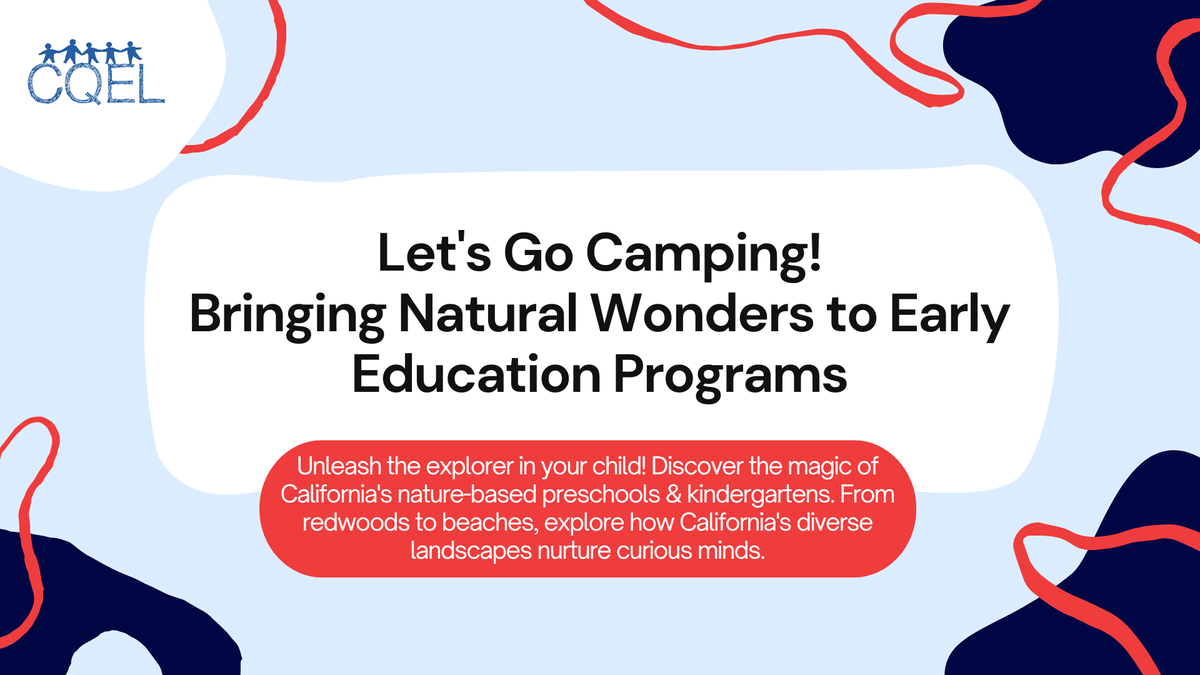Let's Go Camping! Bringing Natural Wonders to Early Education Programs
Unleash the explorer in your child! Discover the magic of California's nature-based preschools & kindergartens. From redwoods to beaches, explore how California's diverse landscapes nurture curious minds.

The call of the wild isn't just for adults! Immerse yourself in the world of nature-based early childhood education and discover how California's diverse landscapes can become vibrant classrooms for young learners. Studies show that connecting with nature boosts cognitive development, fosters physical activity, and sparks a lifelong love for the environment. California, with its breathtaking beaches, towering redwoods, and sprawling deserts, offers a unique opportunity to cultivate young minds while exploring the wonders right outside their doorsteps.
But let's be honest, navigating the logistics of incorporating nature into your program can seem daunting. Concerns about access to green spaces, safety considerations, and integrating nature with existing curriculum might hold you back. Fear not! This guide will equip you with the knowledge and resources to overcome these challenges and unlock the magic of nature-based learning.
Building a Nature-Based Curriculum
Age plays a crucial role in crafting engaging activities. For tiny tots, sensory exploration with leaves, rocks, and water ignites curiosity. Nature walks with stroller rides become mini-adventures, while story time with themes like animal sounds encourages language development. As preschoolers blossom, introduce fun plant identification games, bug hunts, and nature art masterpieces using leaves and rocks. Water play gets an upgrade with outdoor hose activities or mud puddle explorations. Kindergarteners can embark on nature journaling adventures, participate in simple hikes, and become citizen scientists with backyard gardening projects. Remember, the key is to adapt activities to their developmental stage and interests.
Nature isn't just about fun; it's a powerful tool for learning. Integrate nature walks with language development by asking children to describe what they see, smell, and hear. Math concepts blossom through counting leaves, measuring tree heights, or estimating the number of pebbles in a pile. Science comes alive with discussions about animal adaptations, plant lifecycles, and weather patterns. Even social-emotional learning gets a boost as children cooperate during group activities and develop empathy for living things.
Safety is paramount. Sunscreen, insect repellent, and proper supervision in unfamiliar environments are essential. Familiarize yourself with local hazards like poisonous plants and potential wildlife encounters. By taking necessary precautions, you can ensure a safe and enriching experience for all.
Resources and Partnerships
California is brimming with resources to support your nature-based journey. Explore programs like the California Department of Education's "Environmental Literacy and Outdoor Education" initiative or grants like the "Nature Exploration and Discovery Grant" for financial assistance. Websites like "Let's Move! California" offer a wealth of activity ideas and resources.
Transform your outdoor space into a natural wonderland! Utilize recycled materials to create climbing structures, plant a vegetable garden, or incorporate natural elements like logs and rocks into the play area. Websites like "The National Wildlife Federation" provide downloadable guides on creating nature-based playgrounds.
Collaboration is key! Partner with local environmental educators, parks and nature centers, or community gardens. Invite experts to conduct workshops, organize field trips, or simply brainstorm activity ideas. These partnerships enrich your program and connect children with the wider environmental community.
Success Stories and Impact
The magic of nature-based learning unfolds in real timeThis blog post can empower aspiring childcare providers in California to unlock the transformative power of nature-based learning for their young explorers by providing valuable information, practical tips, and inspiring resources! Visit the "California Outdoor Educators Association" website to read inspiring case studies of childcare providers successfully implementing nature-based programs. Witness the positive impact on children's development, from increased curiosity and physical activity to a deeper appreciation for nature.
Engaging parents and the community is vital. Organize family nature walks, share photos and videos of outdoor activities, and encourage families to explore nature together at home. Advocate for more green spaces in your community and connect with local environmental organizations. Together, we can create a network that fosters a love for nature in children of all ages.
Embrace the potential of nature-based learning! Resources like the California Outdoor Educators Association website and the National Wildlife Federation's "Early Childhood Outdoors" program provide a wealth of information and support. Remember, the joy and wonder children discover when connecting with the natural world create lasting memories and shape their environmental consciousness. Start your journey today and witness the magic unfold!
Additional Considerations
- Throughout the content, include relevant keywords like "nature-based early childhood education California," "outdoor learning activities," and "childcare curriculum."
- Incorporate high-quality photos and illustrations showcasing nature-based activities in California settings.
- Consider offering downloadable activity guides or video tutorials as bonus resources.
Let's empower aspiring childcare providers in California to unlock the transformative power of nature-based learning for their young explorers by providing valuable information, practical tips, and inspiring resources. Let's go camping, not just literally, but figuratively, by bringing the wonders of nature into our early childhood programs and nurturing a generation of environmentally conscious citizens!
